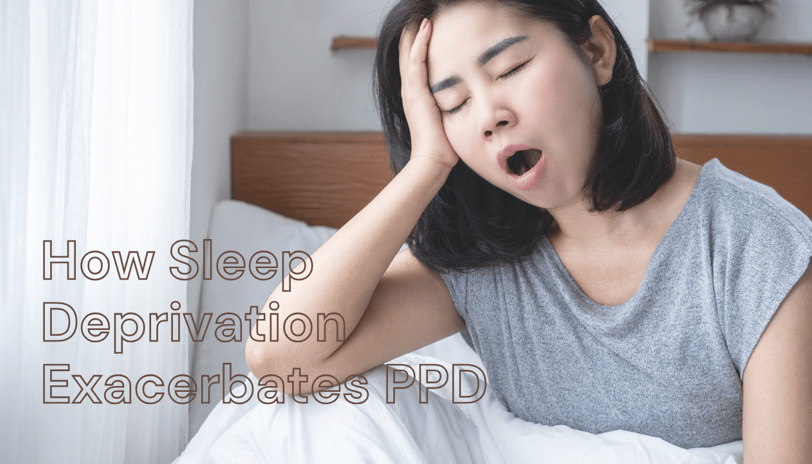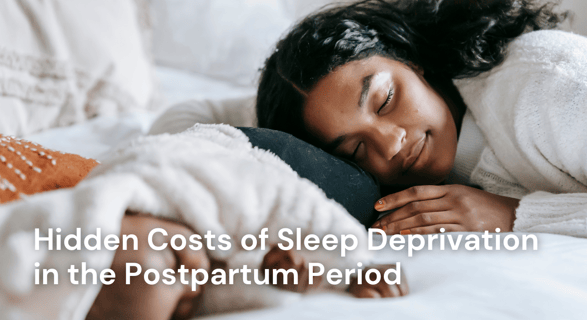How Sleep Deprivation Exacerbates Postpartum Depression
7/1/20254 min read


One of the most universal truths of early parenthood is this: you will not sleep the way you used to. Night feeds, crying spells, cluster feeding, diaper changes, and constant hypervigilance all take their toll. And while most new parents expect to be tired, few fully grasp just how devastating chronic sleep deprivation can be—especially when it intersects with postpartum depression (PPD).
In fact, sleep loss isn’t just a symptom of new parenthood—it’s a core factor that worsens and sustains PPD. The relationship between sleep and mood is deeply intertwined, and when disrupted long enough, it becomes a feedback loop that can be difficult to escape.
At Peace Temple, many of the mothers and fathers we work with are not just emotionally exhausted—they are physically running on fumes. And this lack of rest often amplifies their depression in ways that feel insurmountable.
Why Sleep Is Essential—Especially Postpartum
Sleep is not a luxury. It is a biological necessity that supports mood regulation, hormone balance, cognitive function, and physical recovery. For postpartum individuals, it also plays a critical role in:
Emotional resilience
Decision-making and safety
Bonding with the baby
Milk production (for breastfeeding mothers)
Physical healing after birth
Even a few nights of fragmented sleep can impair these processes, but for many new parents, the deprivation lasts for weeks or months. That’s when the risks grow exponentially.
The Science: How Sleep Deprivation Impacts Mood
Sleep deprivation disrupts the brain’s ability to regulate neurotransmitters like serotonin, dopamine, and cortisol, which are vital for emotional stability. Without adequate sleep:
The amygdala becomes hyperactive, leading to overreactions and emotional volatility.
The prefrontal cortex, responsible for rational thinking and impulse control, goes offline.
Cortisol, the stress hormone, remains elevated, keeping the body in a prolonged state of anxiety and alertness.
This biochemical chaos is fertile ground for depression, anxiety, irritability, and hopelessness—all hallmarks of PPD.
Sleep Loss and PPD: A Two-Way Relationship
Sleep deprivation doesn’t just cause or worsen depression—it also makes it harder to recover from it. Here’s how the cycle plays out:
PPD makes it hard to sleep.
Depression often leads to insomnia, restless sleep, or early waking—even when the baby is asleep. Racing thoughts, guilt, and intrusive worries keep the mind on high alert.Poor sleep worsens PPD symptoms.
The less rest a parent gets, the more emotionally fragile and physically depleted they become. Small stressors feel unmanageable, and even basic tasks can feel monumental.Emotional fatigue fuels shame and self-doubt.
Sleep-deprived parents are more likely to feel like they’re failing, further exacerbating depressive thoughts.
This creates a self-perpetuating loop: the more exhausted you are, the more depressed you feel; and the more depressed you feel, the harder it is to get restful sleep.
Peace Temple’s therapists are trained to help clients break this loop by addressing both emotional and behavioral patterns tied to sleep and mood.


The Hidden Costs of Sleep Deprivation in the Postpartum Period
The impact of sustained sleep loss extends far beyond feeling tired. It touches nearly every part of a parent's well-being:
Impaired decision-making: Sleep-deprived parents are more likely to make errors in baby care or safety.
Increased risk of accidents: Drowsy driving and falls become real risks.
Weakened immune function: Illnesses take longer to heal and leave the body more vulnerable.
Relationship tension: Exhaustion erodes patience, emotional availability, and intimacy with partners.
Delayed bonding: When you're depleted, it's harder to connect emotionally with your baby, which can deepen feelings of guilt and detachment.
At Peace Temple, we often work with clients who feel they are “numb” or “just going through the motions.” When we look deeper, chronic sleep loss is often a major part of the equation.
Recognizing When Sleep Loss Is a Problem
Not all sleep deprivation is the same. Waking up once or twice a night to feed a baby is expected. But when you’re unable to get more than 2–3 hours of uninterrupted sleep over several days—or when even daytime naps feel impossible due to anxiety or emotional exhaustion—it’s time to assess whether PPD might be present.
Red flags include:
Inability to fall asleep even when the baby sleeps
Feeling constantly "on edge" or physically jittery
Thoughts like “I can’t do this” or “I wish I could disappear”
Daytime sleepiness that impairs functioning
Withdrawing from loved ones out of exhaustion
Irritability, crying spells, or emotional numbness
If these symptoms persist, seeking help is not just advisable—it’s essential. Peace Temple’s postpartum mental health specialists offer safe, stigma-free support for navigating these challenges.
What Can Help: Rebuilding Rest in Small, Sustainable Ways
Reclaiming rest may not mean 8 hours of uninterrupted sleep (not yet, anyway)—but it does mean strategically carving out rest and recovery, both physically and emotionally.
1. Shift Your Expectations
Instead of aiming for perfect sleep, aim for enough rest to regulate your nervous system. Even short naps or calm breaks can help.
2. Accept Help—Even If It Feels Hard
Let partners, family, or friends handle one night feed, a diaper change, or chores. Sleep is not selfish—it’s survival. At Peace Temple, we help mothers work through the guilt of receiving help, reframing it as a strength.
3. Sleep Hygiene Still Matters
Create a wind-down routine before bed.
Keep screens away 30 minutes before sleep.
Try calming techniques like deep breathing or guided meditation.
Even if your sleep is broken, these habits prepare your body to rest when you can.
4. Practice Mindfulness or Yoga Nindra
Mindfulness practices don’t replace sleep, but they offer deep rest for the nervous system. Even 10 minutes a day can ease anxiety and support emotional recovery.
5. Talk to a Professional
If your sleep loss is tied to racing thoughts, guilt, or intrusive fears, therapy can help. Peace Temple’s therapists offer tailored support for sleep and mood disturbances rooted in postpartum experiences.
Final Thoughts: Rest Is Not a Luxury—It’s a Lifeline
Sleep deprivation is more than an inconvenience. For postpartum parents, especially those at risk of or already experiencing PPD, it can be a tipping point between coping and collapsing.
The good news? You don’t have to wait for the fog to lift on its own. With the right support, structure, and care, sleep—and emotional wellness—can be restored.
At Peace Temple, we believe in holding space for the full reality of postpartum life—not just the parts that look good on Instagram. And that includes honoring how crucial rest is to recovery.
Because when a mother is well-rested, she is not just surviving—she’s healing.
